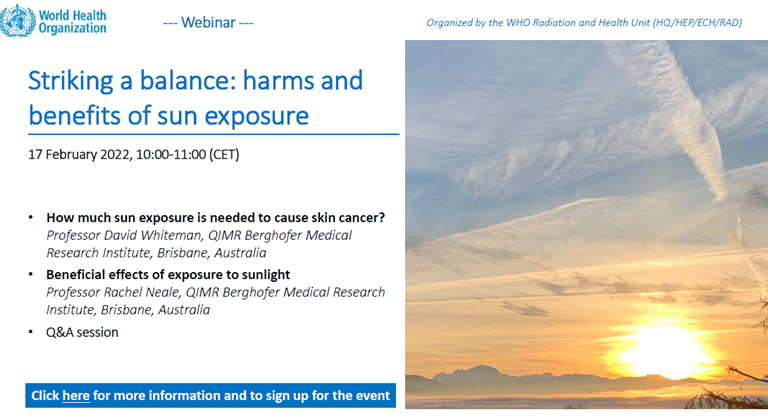Background
Sun exposure poses risks and benefits to human health. It is well-established that ultraviolet radiation (UVR) from the sun is the principal environmental cause of skin cancers. Two recurring public health questions will be addressed: how much UVR causes skin cancer; and whether there is a safe dose of UVR below which there is no risk of skin cancer. The sun is also essential for producing vitamin D and other health benefits. A review of the role of vitamin D in health will be provided, including consideration of the blood concentration considered optimal and the best way to maintain adequate vitamin D status in the absence of supplementation. Other possible benefits of exposure to UV and non-UV wavelengths in sunlight will also be discussed.
Provisional agenda
Moderator: Craig Sinclair, Cancer Council Victoria (WHO Collaborating Centre)
10: 00 – 10:05 - Welcome address – Dr E. van Deventer, WHO
10:05 – 10:25 - How much sun exposure is needed to cause skin cancer? Professor David Whiteman, QIMR Berghofer Medical Research Institute, Brisbane, Australia
10:25 – 10:45 - Beneficial effects of exposure to sunlight. Professor Rachel Neale, QIMR Berghofer Medical Research Institute, Brisbane, Australia
10:45 – 11:00 - Q&A session
Speakers
David Whiteman
Professor David Whiteman is a medical epidemiologist with a special interest in the causes, control and prevention of cancer. He has an international reputation for research into melanoma and skin cancer, and the public health aspects of cancer control.
He is a Fellow of the Australian Academy of Health and Medical Sciences, a Fellow of the Australasian Faculty of Public Health Medicine, and Honorary Fellow of the Skin Cancer College of Australasia. In 2019, he was made a Member of the Order of Australia
for his services to cancer epidemiology.
Professor Rachel Neale
Professor Rachel Neale is a cancer epidemiologist with special interest in balancing the risks and benefits of sun exposure. She has recently completed the world’s second-largest trial of high-dose vitamin D supplementation, the D-Health Trial, and leads research aiming to understand the effects of sunscreen application on vitamin D. Professor Neale leads the health working group of the United Nations Environment Program Environmental Effects Assessment Panel, one of three panels established to report to the Parties to the Montreal Protocol.

